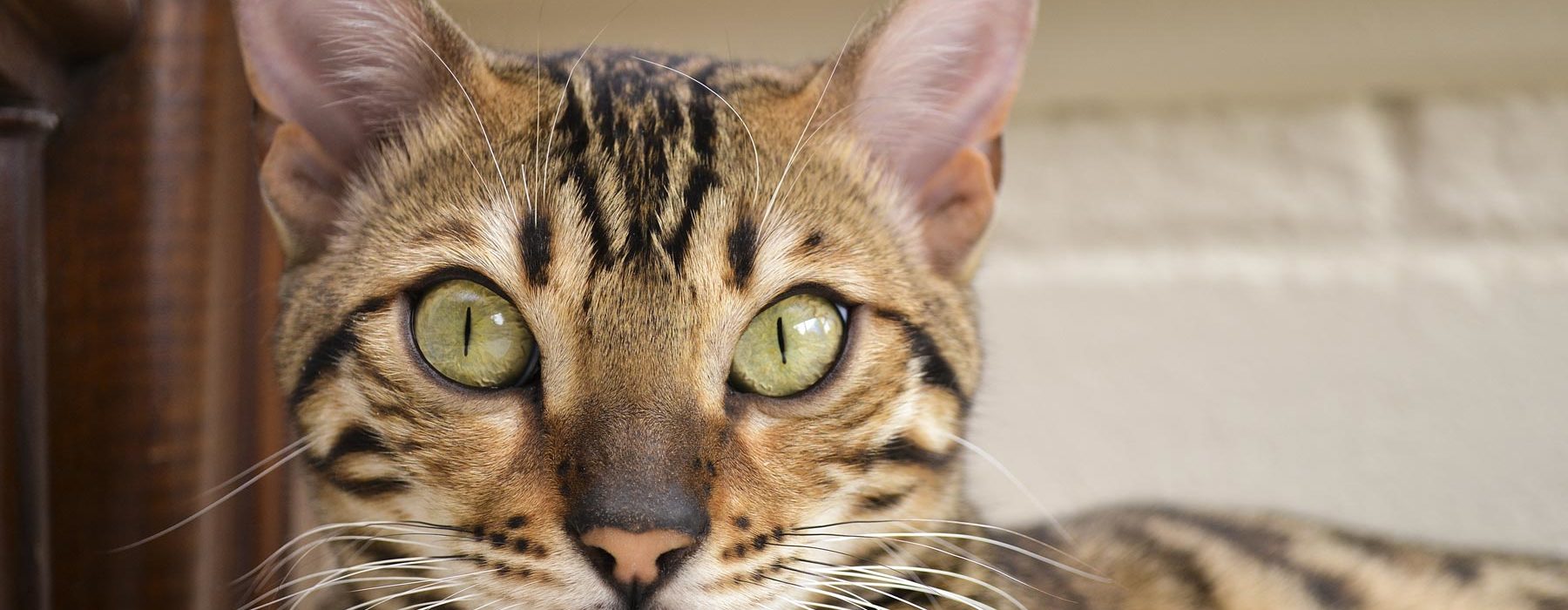How much does a Bengal cat cost?
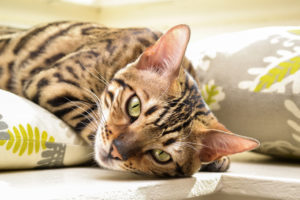
For a pet Bengal kitten, the current average price is $1,500 – $3,000 (USD) when buying from a good breeder. Several factors affect this price, including the kitten’s traits, what the breeder includes with the kitten, and most importantly, the level of breeder care that went into raising the kitten.
Wait, so you’re saying $2,000 is the current AVERAGE price for a Bengal cat?!
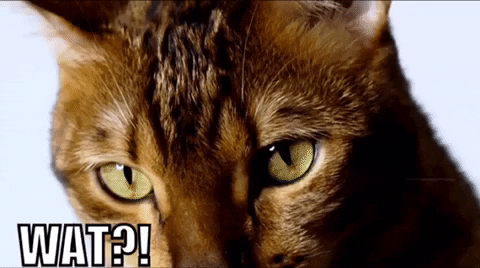
Yes! And there are many factors that go into this price. It’s a common perception that the only difference between an “expensive” Bengal and a “cheaper” Bengal is whether or not they come with pedigree papers, but price is a reflection of so much more. The reality is that breeding Bengals is an extremely expensive hobby, when done ethically. In fact, breeders with kittens priced at $2,000 often barely make back their expenses!
If you’re looking into adopting a Bengal, you’ll want to know about all the factors that could impact price so that you can make an educated decision. If this is you… keep reading!
Where do I find a Bengal Cat for sale?
First of all, where do you even find a Bengal cat for sale?! Here’s what you’ll want to know:
- It’s super important to make a careful decision. You hope to have this animal for 15+ years! Take your time when researching. This article will help you make an educated decision when considering important cost factors!
- Avoid your typical “classifieds” websites. Stay far away from Craigslist, Ebay Classifieds, and Hoobly. This is just going to lead you to backyard breeders or scams. If it looks too good to be true, it probably is!
- The best option for finding a Bengal kitten is finding and working with a reputable, ethical breeder. These are people who are dedicated to raising healthy kittens that exemplify everything there is to love about the breed. The pricing discussed below is what to expect when searching for a breeder.
What can I expect at different price points for a Bengal cat?
The infographic below breaks down what you can expect at each price point for a Bengal kitten. Note that this price guide is for an SBT Bengal kitten, in US Dollars as of 2024.
- Under $500: Run the opposite direction! This will always be a backyard breeder or a scam.
- $500-$1,000: Be cautious. Could very likely be a backyard breeder or scam.
- $1,000-$1,500: On the low end of what you should expect to pay for a purebred Bengal kitten.
- $1,500-$2,000: A good average price.
- $2,000-$2,500: On the higher side, but still a very fair price for a Bengal kitten in 2024. Likely from an established breeder with decent demand.
- Over $2,500: On the very high end of kitten prices, possibly from a cattery with champion bloodlines.
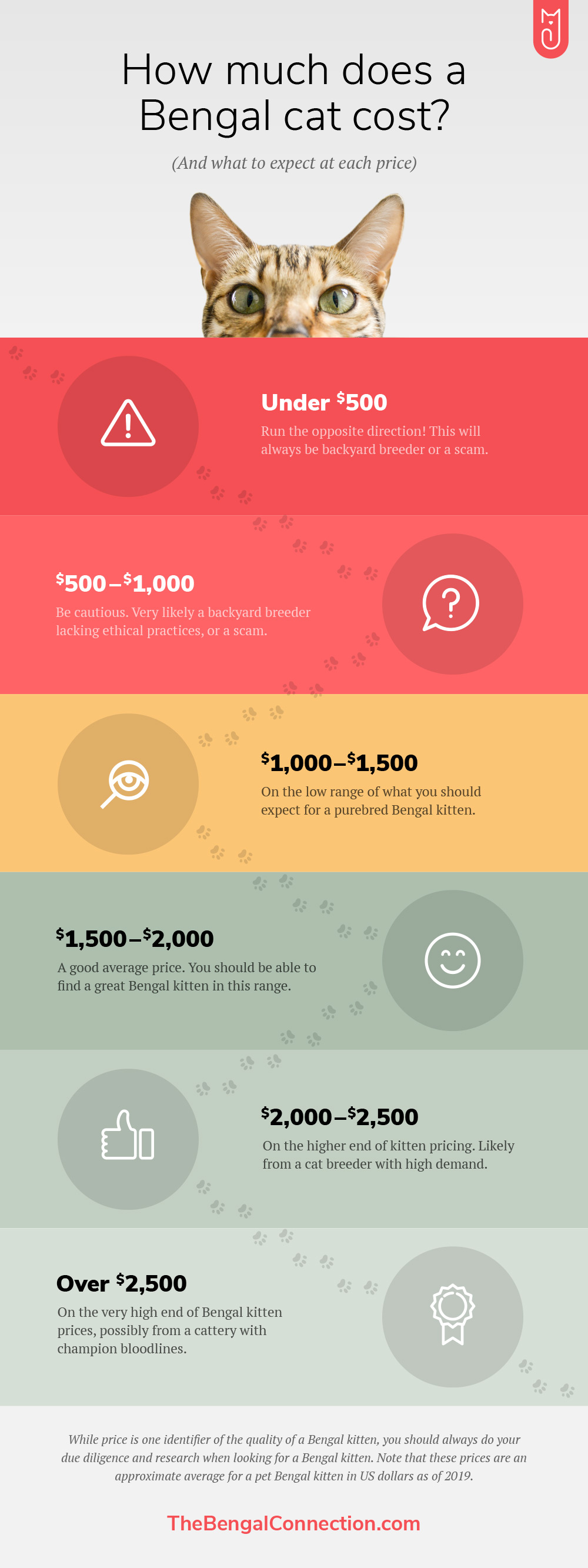
What factors influence the price of a Bengal cat?
There are 3 main factors that affect the price of a Bengal kitten:
- The kitten’s traits: generation, quality, age, temperament, and demand for such a kitten (often demand is associated with color)
- What’s included with the kitten
- The level of breeder care (possibly the most important factor!)
Price Factor #1: The Kitten’s Traits
Generation
When looking for a Bengal kitten, you’ll mostly find SBT (Stud Book Tradition) Bengals. These are kittens that are produced from Bengals being bred to Bengals, and are at least 4 generations removed from the Asian Leopard Cat. If you stumble across Bengals that are higher generations (called F2 or F3 Bengals), these kittens will usually cost more and have additional care requirements. SBT’s are generally the best choice for a pet owner.
Quality
The level of breeder care (which we’ll talk about in a minute) shows in the quality of the kitten you’re looking at. Healthy, energetic, bright-eyed kittens with stunning, sleek coats (once they’re out of the fuzzy stage) is what you’ll generally want to look for. But if you learn about Bengal Type, you’ll be able to recognize many other unique physical traits of the Bengal cat breed that may go unappreciated to the untrained eye.
Breeding for quality means that breeders have to pay a significant amount of money (sometimes tens of thousands of dollars) for cats from quality lines, with breeding rights. Breeders do this to preserve and improve the Bengal breed, but they have to charge more for their kittens as a result.
Some breeders will also choose to price individual kittens differently based on the quality of their appearance.
Note that when looking for a Bengal, you might see kittens described as pet vs. breeder vs. show quality. The typical Bengal you’d be looking for may be pet quality, but some exceptional kittens are identified as breeder or show quality.
Breeder quality indicates that a kitten has great traits that are ideal to pass down in order to preserve or improve the Bengal breed. This kitten would be sold to a registered breeder and include breeder rights, meaning they can legally breed it.
Show quality is a step above breeder quality. It means that the kitten has all the desired traits you want to see in a Bengal, and could do very well when judged in a cat show. You would pay more for a Bengal that comes with showing rights.
For those interested in showing or breeding Bengals, all pricing we discussed above can be thrown out the window. Prices that include breeding or show rights are much higher, usually starting at $2,500 on the low end and increasing to even tens of thousand of dollars. Pricing factors for show or breeder quality Bengals include the appearance, lineage, or potential benefit the cat can bring to a breeding program.
Age
Growing kittens are expensive to feed, and it takes a lot of time to socialize them and clean up after them! When you see an inexpensively priced kitten that’s allowed to go home at 8 weeks or earlier, this is a huge red flag. The breeder is trying to cut costs… but at the expense of the kitten.
Kittens that are weaned too early are prone to lifelong behavior issues, including fear and aggression. A kitten that goes home between 12-16 weeks old may be a little more expensive due to the extra cost to raise them, and the extra socialization time, but the result is a much more socially developed kitten.
On the other hand, there may be situations where a kitten was returned to a breeder for an unusual circumstance and the breeder is now looking to re-home an older kitten. Kittens nearing adulthood may be priced lower, as the new family may feel like they missed out on kittenhood. This can be a great way to obtain a more “affordable” Bengal, as long as you’re equipped to help the older kitten through a more difficult transition.
Demand
The higher the demand for certain Bengals, the greater the cost. Bengals can have many different coat colors, including Brown, Silver, Snow, Charcoal, and Melanistic. There are also a variety of patterns including spotted, different types of rosettes, and marbling. Different coats and colors may be “trending,” which could lead to a higher demand and a higher cost. Some colors are more rare, which can affect cost as well.
Supply and demand within your geographical area could affect price as well. Reputable breeders may have a long waitlist of individuals waiting for a Bengal kitten from them, and this can mean higher prices. Or there may simply be more demand in your area than there are good breeders.
And although Bengals are not typically priced according to their known skills, a skateboard riding Bengal would probably cost more as well, due to demand for such an impressive cat 😉
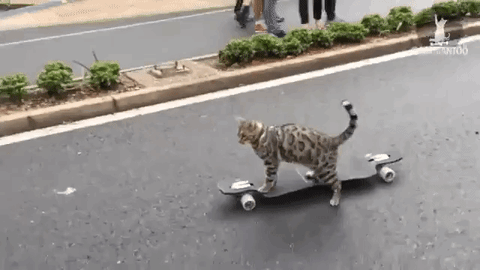
Price Factor #2: What’s Included with Your Kitten
To help get you started on the right paw, many breeders will make sure their kittens and families are fully equipped for their new adventures…
Most Bengal kittens should come with the following:
- Spay or neuter surgery already complete
- Examined and given a clear bill of health by a licensed veterinarian
- Have all necessary vaccinations up to date
- Deworming complete
- Health records booklet
- TICA blue slip for registration
- Health guarantee
- Lots of support and advice from your breeder
Your Bengal kitten might even come with:
- Microchip with registration
- A pet insurance trial
- A cat wheel
- Toys and blankets
- An airline approved carrier
- Food to help you transition
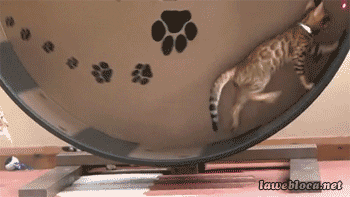
Yes, Bengal cats love running on giant hamster wheels.
The more “extras” are included with your kitten, the higher the price may be.
Price Factor #3: Level of Breeder Care
The factors we listed above are easy enough to gauge quickly, but determining the level of breeder care will require a little more diligent investigation on your part. However, it’s incredibly important to know about the breeder you’re intending to work with.
Why? Because the level of breeder care impacts the kitten you’re going to get, and also because the person you give money to is the person you’re supporting.
Put differently, level of breeder care impacts price but it also directly impacts both the health of your kitten and quality of life of the breeder’s cats.
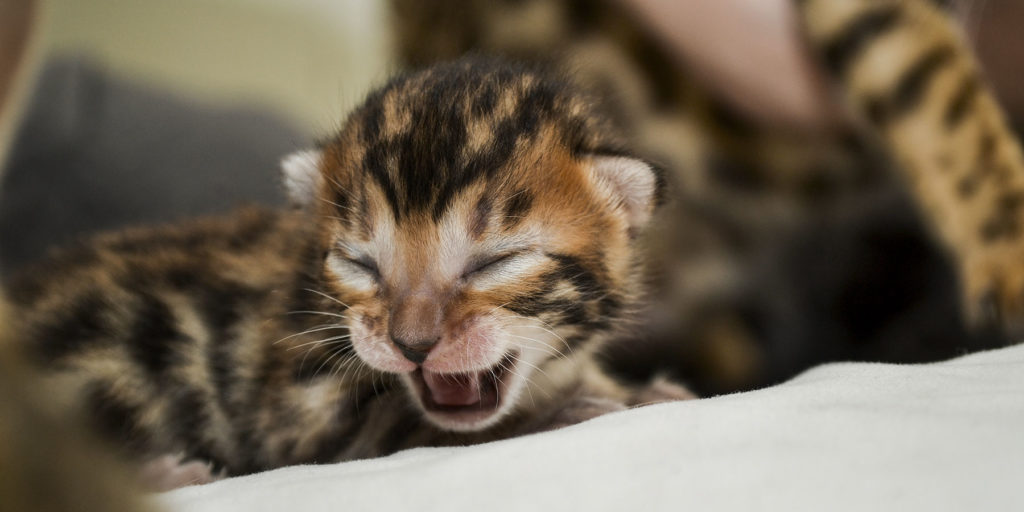
An ethical breeder will never sacrifice the wellbeing of their animals for the sake of a lower price for the buyer.
So when searching for a kitten, you may want to pay slightly less attention to the kitten itself and focus your attention on the breeder. A breeder who cares will “do things right,” which includes the following:
Health Testing
Any time you limit the gene pool in order to achieve a specific goal in an animal—in this case, a beautiful cat that looks like a leopard cat and has an awesome temperament—you’re also subjecting that breed to the possibility of doubling up the bad genes in addition to the good genes. A knowledgeable breeder is going to be well aware of this, and will be diligent about keeping the health of the breed a prominent focus. But this requires testing, which costs money.
With Bengals, there are currently 3 genetic conditions that we are actively screening or testing for: HCM, PRA, and PK-def. We cover these health conditions in detail in this post.
The most prominent factor to kitten pricing is HCM screening. This must be done by a cardiologist and can cost $300-$1,000 per cat, and it’s recommended that cats are screened every year. A breeder selling cheap kittens cannot afford this screening.
In addition to genetic health testing, breeders must be diligent about routinely screening for infectious disease and address anything that crops up in a timely manner.
This all means that a kitten that comes from health tested lines will cost more than a kitten from a breeder who skips this, but it’s so important that health is at the forefront of any breeding program.
New! Bengal Breeder Directory
If you’re looking for a Bengal kitten or Bengal cat for sale, we now have a Bengal Breeder Directory to help you find a breeder! You can use the directory to find a breeder who prioritizes health testing and has the marks of an ethical breeder as discussed more below.
Housing
It’s a fact of breeding that you can’t keep the males in your house. They spray. And more often than not, intact females will spray too.
Therefore, most breeders choose to build separate buildings with outdoor enclosures. These buildings need to be cleanable and have plenty of space and environmental enrichments to keep the boys happy. It could be as simple as a modified shed, with added insulation and heating/cooling. Or it could be a custom build. Either way, it is extremely expensive.

Regardless, breeders who care about the wellbeing of their cats will never house their cats in cages.
Yes, a cage only costs about $60 and an enclosure could cost upwards of $6,000. It’s a massive difference and the quality of housing can hugely impact the price that kittens must be sold for.
When looking for a kitten, it’s incredibly important that you know about the housing conditions of the adults so that you only support an ethical breeder.
Quality Diet

Cats are obligate carnivores, meat-eaters through and through. Meat is expensive, therefore, quality cat food is expensive.
But a healthy diet is extremely important to healthy cats, including nursing mothers and energetic, growing kittens. An ethical breeder will feed their cats the best food that they can afford.
Time
I would like to say that the more time a breeder spends with their cats and kittens, including play time, socialization, and cleaning chores, the more they will be able to charge for their kittens in order to compensate them for their time.
In reality, this is not the case! For breeders, time is something that has to be given willingly out of love for the animals, with no expectation of monetary compensation. Just be aware of the kind of time you can tell your breeder puts into their program… from keeping a clean environment, to taking the time to talk with you, to hours and hours spent socializing so that you can have a wonderful pet. Avoid the breeder who does not give breeding the time it requires, as this will inevitably be detrimental to the kitten you’ll take home.
Registration
It’s assumed that registered cats are more expensive and non-pedigreed Bengals are cheaper. Some argue it’s not worth “paying for the papers” if all you want is a nice pet.
Pedigreed cats are more expensive, but not for the reasons you might think. It only costs $35/year to be a TICA member and $13 to register a litter. Breeders do not avoid being registered because it’s expensive. They avoid being registered because they did not pay for breeding rights, which means they don’t have breeding rights and can’t register.
By buying a kitten from someone without breeding rights, you’re supporting someone who is simply irresponsibly breeding their pet to make some money. That also likely means they aren’t doing anything else we talked about above.
Avoiding Scams & Backyard Breeders
In general, we recommend avoiding a breeder who advertises prices less than $1,000. A kitten priced this low usually means a scam or a “backyard breeder”.
Scams
One common scam is someone who takes your money but never delivers a kitten. Don’t be one of those people who falls for a scam! One obvious red flag is a price that’s too good to be true. But some scams manage to steal thousands of dollars from buyers who are simply too eager to get a kitten and don’t put the time or effort into research.
If you’re doing due diligence in talking with your breeder about the things we discussed above, you’ll be able to avoid a scam. When you try to rush into buying a kitten, nothing good will happen. You have to make sure you’re talking to a legitimate breeder and they do indeed have a real kitten for you! If you can’t visit in person, you should be getting a lot of videos and ask the breeder to mention the date and your name in the video with the kitten. You can even use Skype and Facetime.
Another type of scam is someone who’s selling “half-bengals” for a few hundred dollars. While these kittens may be cute (and lower priced!), don’t fall for it. This scammer will tell you a convincing story about how the litter was an accident, and now they’re just trying to find good homes. But make no mistake, it’s usually intentional because this “breeder” knows they can make money from unsuspecting people who are looking for their first Bengal! Don’t give an irresponsible person your money. You can find JUST as cute of a kitten in need of a home at a shelter if you’re not looking for a purebred Bengal.
Backyard Breeders
A backyard breeder is someone who’s breeding purebred Bengals but is cutting corners in order to reduce their expenses. They’re able to attract a greater volume of buyers with their low prices. The result is that they can make more profit than ethical breeders as long as there are buyers willing to support their practices. Please don’t be one of those buyers!
Backyard breeders may use any of the following methods to reduce expenses:
- Keeping cats in small, inexpensive cages instead of spacious enclosures.
- Skipping health screenings (and potentially breeding and selling cats affected by HCM, PK-def, or PRA).
- Not following good husbandry practices (like keeping a clean environment) in order to save time and money, which leads to the spread of disease and general poor cat health.
- Choosing to feed a poor/low quality diet.
- Sending kittens home way too early, sometimes at 8 weeks or younger (kittens should be going home at 12-16 weeks old). It’s very expensive to feed a litter of growing kittens, and much cheaper to “get rid of them” fast!
- Choosing inexpensive breeders cats that do not exemplify the breed in terms of appearance or temperament. The resulting kittens do not improve the Bengal breed and the effect is a “watered down” breed.
At the risk of stating the obvious, no unethical breeder should ever be supported. It’s just not worth the small cost savings for you. In fact, in many cases, a kitten from a backyard breeder will be brought home in poor health and need vet bills that add up to much more than the cost of a kitten from a reputable breeder!
Note: Not ALL backyard breeders will be selling at cheap prices. Some are actually still getting thousands of dollars for their kittens because buyers don’t know what to look for. Make sure you use our “Choosing Your Bengal Breeder” worksheet when searching for a Bengal kitten!
What if I can’t afford a Bengal?
If you’re wanting to find a Bengal cat for less than $1,000, we really don’t want you to be tempted by a backyard breeder or scam. For a cheaper Bengal, you have 3 good, viable options:
- Find a rescue network. You’ll be working with very limited availability, so you’ll have to be patient.
- Find a recently retired Bengal breeder. Again, probably very limited availability and even more rigorous home screenings will be done to find the right fit.
- Be on alert for an older kitten or adult that a breeder is re-homing. On a rare occasion, a kitten or adult will be returned to the breeder because it did not work out for some reason.
In all 3 situations, you have to be aware that the cat or older kitten you’ll be getting may not integrate into your home as easily as a young kitten. They may have special needs, or reasons that they were re-homed in the first place. You may need to be more experienced with correcting undesirable behavior in cats, and have a lot of patience for the situation. It can be incredibly rewarding to provide a forever-home for a cat who was let down before.
When considering Bengal cat price, remember that there is no such thing as a free pet!
Whether the upfront cost is $2,000 or free, ALL pets require food, supplies, and vet care. In fact, by paying a little more for a kitten with a known health record and health guarantee, you’ll likely avoid the costly vet bills that can add up when you pick up a stray kitten or buy a kitten from a non-reputable breeder.
Articles like this one have evaluated the annual cost of owning a cat to be approximately $1,000! And this is an animal that you hope to have as a member of your family for 10 to 15 (or more) years!
With this perspective, you can quickly see why choosing your breeder with care is so much more important than trying to save a bit of money.
Next Steps
Just from finishing this article, you’re already going to be super well equipped to start your own search for adding a Bengal to your family!
Read about Bengal Basics
If you’re still not sure if a Bengal would be a good fit for you, we have more articles to help you out. Because of our own deep love for the Bengal breed, we want all Bengal owners to be as prepared and committed as possible!
Read about Bengal BasicsFind a Bengal Breeder
To get you started in your search for a Bengal Cat Breeder, we’ve created a new Directory! You can use this tool to find a Breeder near you, or search for breeders who may offer delivery options.
Visit the Bengal Breeder DirectoryTips for Choosing Your Bengal Breeder

